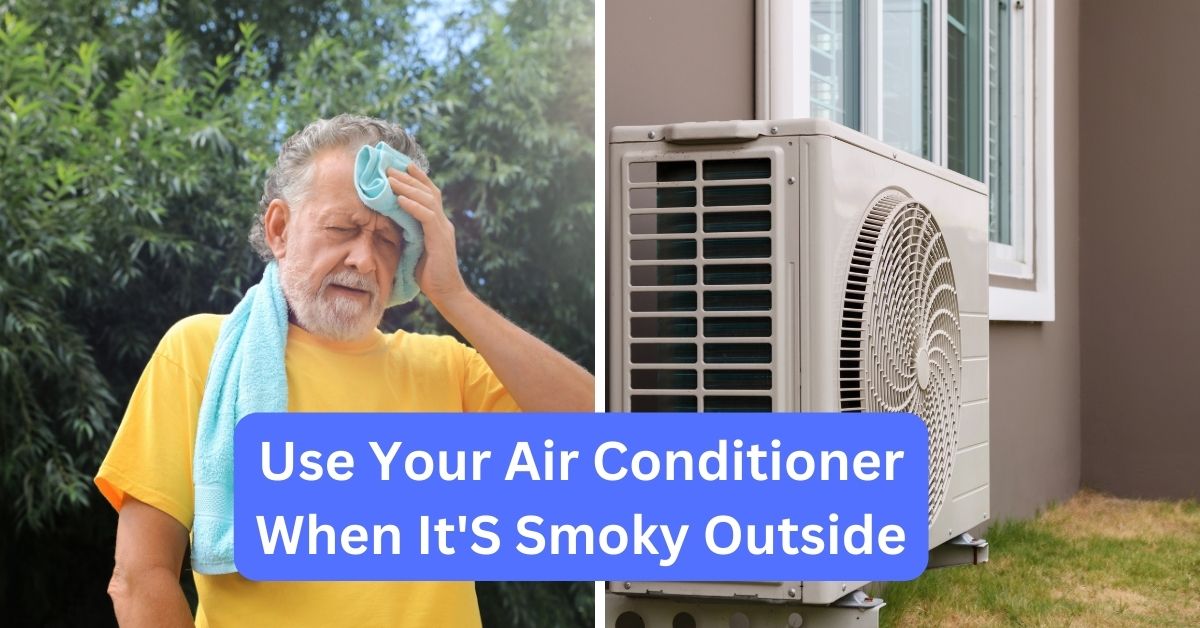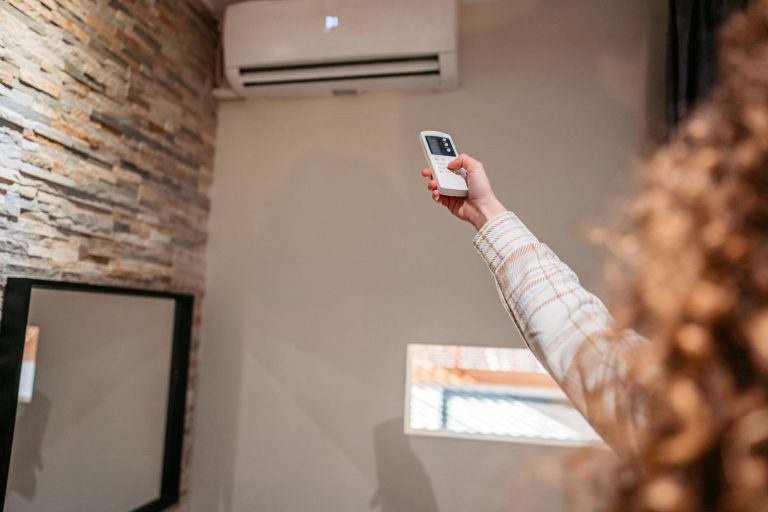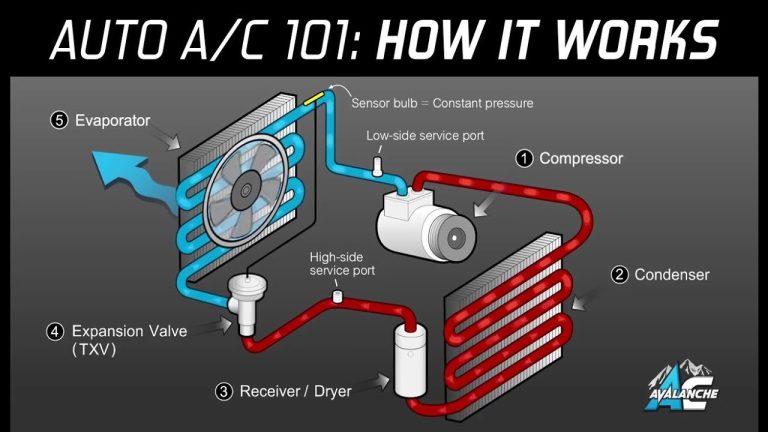Can You Use Your Air Conditioner When It’S Smoky Outside? Guidelines And Tips
Yes, you can use your air conditioner when it’s smoky outside. However, it is recommended to use the recirculation mode instead of bringing in outside air. This will help to filter out the smoke particles and improve indoor air quality. It’s also important to regularly clean or replace the air filters to ensure optimal functioning of the air conditioner.
As the hot summer days roll in, homeowners and apartment dwellers rely on their trusty air conditioners to keep their indoor environments cool and comfortable. But what happens when the air outside becomes thick with smoke, obscuring the skies and causing concern for air quality? Can you use your air conditioner when it’s smoky outside? This is a question that many people who own air conditioning units ponder, as they want to ensure they can stay cool without compromising their indoor air quality.
In this blog article, we will delve into the topic of using air conditioners when it’s smoky outside and provide you with the answers you need. We will explore the potential risks and benefits of running your air conditioner during smoky conditions, considering both safety and effectiveness.
Whether you’re facing a wildfire in your area or dealing with seasonal smog, this article aims to arm you with the knowledge and insights to make an informed decision. We will begin by examining how air conditioners work and their role in maintaining indoor air quality. From there, we’ll discuss the potential risks associated with using your air conditioner in smoky conditions and provide practical tips on how to mitigate these risks.
Additionally, we will explore alternative methods of cooling your home when the air outside is compromised. Our goal is to equip you, the homeowner or apartment dweller, with the necessary information to navigate smoky conditions while keeping your indoor environment comfortable and healthy. So sit back, relax, and let us guide you through the intricacies of using your air conditioner when it’s smoky outside.

How Air Conditioners Work and Their Role in Maintaining Indoor Air Quality
Understanding the Mechanics of Air Conditioning
Before we delve into the topic of whether you can use your air conditioner when it’s smoky outside, let’s first understand how these cooling systems work. Air conditioners, whether central or window units, function on the principles of refrigeration.
The process begins with the compressor, which pressurizes the refrigerant gas and turns it into a high-pressure, high-temperature gas. As this gas passes through the condenser coils located outside the unit, it releases heat and transforms back into a liquid state.
The liquid refrigerant then travels to the evaporator coils inside the unit, where it undergoes a phase change and evaporates into a gas again. During this phase change, heat is absorbed from the indoor air, cooling it in the process. The cooled air is then circulated back into the room, while the hot refrigerant gas returns to the compressor to repeat the cycle.
In addition to cooling the air, air conditioners also dehumidify it. As warm air passes over the evaporator coils, moisture condenses and collects in a drain pan, reducing the humidity levels in the room.
The Impact of Air Conditioners on Indoor Air Quality
Indoor air quality is a significant concern for individuals, especially when faced with smoky conditions outside. Air conditioners can play a vital role in maintaining good indoor air quality by performing several functions:
- Filtering the Air: Air conditioning units often come equipped with air filters that capture dust, pollen, and other airborne particles. These filters help improve the air quality by trapping contaminants and preventing them from circulating in the room.
- Ventilation: Some air conditioners have ventilation capabilities, allowing fresh outdoor air to be introduced into the indoor space. This can help dilute indoor pollutants and improve overall air quality.
- Controlling Humidity: As mentioned earlier, air conditioners remove moisture from the air, effectively controlling humidity levels. High humidity can lead to mold and mildew growth, which can negatively impact indoor air quality and trigger respiratory issues.
When your air conditioner is functioning correctly, it can help create a healthier indoor environment by filtering out pollutants, controlling humidity, and promoting proper ventilation. However, during smoky conditions, certain considerations need to be taken into account.
The Potential Risks of Using Your Air Conditioner When It’s Smoky Outside
The Impact of Outdoor Air Quality on Indoor Air Quality
When smoke from wildfires, industrial fires, or other sources fills the air, it can pose a threat to both outdoor and indoor air quality. The microscopic particles present in smoke, such as ash, soot, and volatile organic compounds (VOCs), can infiltrate your home despite closed windows and doors.
While air conditioners can help mitigate some of these pollutants, it’s important to consider that they are not designed specifically for handling smoke particles. Most standard air filters found in residential air conditioners are not equipped with the fine filtration necessary to capture these tiny particles effectively.
Potential Contamination of Air Conditioner Components
Using your air conditioner during smoky conditions can also lead to the contamination of its components. The smoke particles can find their way into the air intake of the unit, clogging the filters and reducing the system’s effectiveness over time. This can result in decreased cooling performance and increased energy consumption.
Additionally, the smoke particles may settle on the evaporator coils, reducing their efficiency and potentially leading to the growth of mold or bacteria. This can further compromise indoor air quality and potentially cause health issues, especially for individuals with respiratory conditions.
Health Concerns and Respiratory Issues
Individuals with pre-existing respiratory conditions, such as asthma or chronic obstructive pulmonary disease (COPD), may be more susceptible to the negative effects of smoky conditions. The fine particles present in smoke can irritate the airways and trigger symptoms, such as coughing, wheezing, and shortness of breath.
Using your air conditioner when it’s smoky outside may inadvertently introduce these particles into your home, potentially exacerbating respiratory issues for those with sensitive respiratory systems.
Mitigating the Risks: Tips for Using Your Air Conditioner in Smoky Conditions
While it is generally advisable to reduce the use of air conditioners during smoky conditions, there are steps you can take to mitigate the risks and maintain a certain level of comfort.
1. Close Windows and Doors
To prevent smoke from infiltrating your home, it’s essential to keep your windows and doors tightly closed. Use weatherstripping and caulking to seal any gaps or cracks that may allow smoke to enter.
2. Upgrade Your Air Filters
Consider upgrading the air filters in your air conditioning unit to ones with a higher MERV (Minimum Efficiency Reporting Value) rating. Look for filters labeled as “smoke stop” or “high-efficiency” to increase their effectiveness in capturing smoke particles.
3. Maintain Your Air Conditioner Regularly
Regular maintenance of your air conditioning unit is crucial, especially during smoky conditions. Clean or replace the filters more frequently to prevent buildup and ensure optimal performance. Consider professional servicing to clean the coils and remove any contaminants that may have accumulated.
4. Use Additional Air Purification Methods
Supplement your air conditioner with additional air purification methods, such as standalone HEPA air purifiers. These devices are specifically designed to capture fine particles, including those present in smoke.
5. Monitor Air Quality Levels
Keep track of the air quality levels in your area using reliable sources, such as local air quality monitoring websites or apps. If the air quality index indicates hazardous conditions, it’s best to avoid using your air conditioner altogether.
6. Consider Evacuation if Necessary
In extreme cases of heavy smoke or poor air quality, it may be necessary to evacuate your home temporarily. Follow the guidance provided by local authorities and seek shelter in a location with cleaner air until conditions improve.
Alternative Methods of Cooling During Smoky Conditions
If you decide not to use your air conditioner during smoky conditions or need to complement its usage, there are alternative methods of cooling your home that can provide relief:
1. Fans
Ceiling fans, pedestal fans, or portable fans can help circulate the air and create a cooling effect, even without the use of air conditioning. They can be particularly useful in the evening or early morning when outdoor temperatures are lower.
2. Natural Ventilation
When outdoor air quality permits, opening windows and using cross-ventilation techniques can help cool your home naturally. This involves strategically positioning windows and creating airflow by opening windows on opposite sides of the house.
3. Window Coverings
Using window coverings, such as blinds or curtains, can help block direct sunlight and reduce heat gain. This can be especially beneficial during the hottest parts of the day.
4. Heat-Reducing Measures
Implementing heat-reducing measures, such as shading outdoor areas, insulating the attic, or applying reflective coatings to windows, can help keep your home cooler and reduce the need for extensive cooling.
5. Cool Showers or Baths
Taking cool showers or baths can provide temporary relief from the heat and help lower your body temperature.
6. Stay Hydrated
During smoky conditions, it’s essential to stay hydrated, as the heat and smoke can dehydrate your body more quickly. Drink plenty of water and avoid excessive caffeine or alcohol consumption.
When faced with smoky conditions outside, it’s important to weigh the risks and benefits of using your air conditioner. While air conditioners can help maintain indoor air quality to a certain extent, their effectiveness in removing smoke particles may be limited.
By following the tips mentioned above and monitoring air quality levels, you can make an informed decision on whether to use your air conditioner during smoky conditions or explore alternative cooling methods. Prioritizing your health and well-being should be the ultimate goal, ensuring a comfortable and safe indoor environment.
It’s Smoky Outside
Frequently Asked Questions (FAQ)
Can you use your air conditioner when it’s smoky outside?
Does using an air conditioner help in reducing smoke inside the house?
Should I set my air conditioner to recirculate mode during smoky conditions?
Does running the air conditioner worsen the air quality during smoky conditions?
Are there any additional steps to take while using the air conditioner during smoky conditions?
Final Words: Considerations and Mitigation Strategies for Using Air Conditioners during Smoky Conditions
In conclusion, the use of air conditioners when it’s smoky outside can have potential risks and considerations. While air conditioners play a vital role in maintaining indoor air quality by filtering the air, controlling humidity, and promoting ventilation, they may not be specifically designed to handle smoke particles effectively.
The microscopic particles present in smoke can infiltrate your home despite closed windows and doors, potentially compromising indoor air quality and contaminating air conditioner components. This can lead to decreased cooling performance and increased energy consumption.
Individuals with respiratory conditions may be more susceptible to the negative effects of smoky conditions, as the fine particles can irritate the airways and trigger symptoms. To mitigate these risks, it is advisable to reduce the use of air conditioners during smoky conditions. However, if you choose to use your air conditioner, there are steps you can take to minimize the impact.
Closing windows and doors tightly, upgrading air filters to higher MERV ratings, maintaining the unit regularly, using additional air purification methods, and monitoring air quality levels are all recommended. In extreme cases of heavy smoke or poor air quality, evacuation may be necessary. Alternatively, there are alternative methods of cooling your home during smoky conditions that can provide relief, such as using fans, natural ventilation, window coverings, implementing heat-reducing measures, taking cool showers or baths, and staying hydrated.






